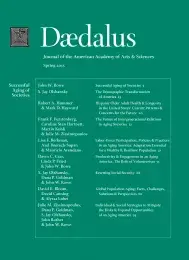The Future of Intergenerational Relations in Aging Societies
As the pressure mounts to reduce the public costs of supporting rapidly aging societies, responsibility for supporting elderly people will increasingly fall on their family members. This essay explores the family's capacity to respond to these growing challenges. In particular, we examine how family change and growing inequality pose special problems in developed nations, especially the United States. This essay mentions a series of studies supported by the MacArthur Foundation Research Network on an Aging Society that aim to examine the future of intergenerational exchange. We focus particularly on adults who have dependent and young-adult children and who must also care for elderly parents, a fraction of the population that will grow substantially in the coming twenty-five years.
Family systems are among the most enduring and universal institutions that human beings have devised; in one form or another, they exist in every society as a social arrangement for regulating reproduction, supporting the young, and caring for the elderly. The survival of family systems stems from their remarkable ability to transform their structure and practices in response to new demographic, social, and economic conditions. That the family system has persevered despite the vast global changes of the last century attests to this resiliency and adaptability. But there are a number of indications that the family’s capacity to perform its traditional functions is becoming strained as the pace of social and economic change quickens around the globe.
Family formation and childbearing, robust a half-century ago, have slowed to below population replacement levels in most developed nations. Marriage has become a less central and stable institution, making child care more precarious. The breakdown of the gender-based division of labor has challenged women and men to develop more complex routines for managing work and family roles. Greater parental investment and support is required for childrearing today: lengthier and increasingly expensive post-secondary education and depressed job prospects have prolonged young adults’ dependency on their parents. On the other hand, a rapid increase in longevity has enlarged the ranks of the elderly, contributing–along with the smaller number of the young– to an increase in their share of the total population. This adds to the elderly’s capacity to assist younger generations, though at the same time it increases the future burdens on younger generations to support and care for elderly family members when they become frail and incapacitated. . . .
Access the full volume here.
